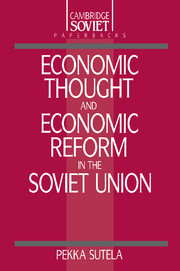1 - The Soviet political economy of socialism
Published online by Cambridge University Press: 20 May 2010
Summary
Introduction
The position of economic science under Soviet socialism is an apparent paradox. On the basis of official doctrine one would expect social sciences in general and economics in particular to have a central policy-forming influence. After all, while Marx may have seen his work primarily as a criticism of the classical political economy of Adam Smith and David Ricardo, most Marxists after him and especially the Marxist–Leninists among them have had a different claim to make. Their doctrine, the Marxist–Leninists have always argued, is the only proper scientific theory of any society and of socialism in particular. Even more important is their claim on the specificity of socialism: in contradistinction to capitalism it does not come about and function spontaneously. It must be brought about by conscious action, planned and managed following the objective laws of society as discovered by Marxism–Leninism. Given the determining role the economy is postulated to have in the society, the fundamental importance of economic science would seem to follow. Managing society must be based on social science, Marxism–Leninism argues.
On a second look, nothing seems to be further from the truth. Not only have outsiders often censured Marxism–Leninism as an empirically empty ideology, as apologetics, and Soviet planning as ‘planning without theory’, but official Soviet spokesmen have also admitted that both the scholarly level of social sciences and their use as a policy tool leave much to be desired. Such criticism has been especially conspicuous during the last few years. It was voiced by the then Secretary General Yuri Andropov and his immediate successor Konstantin Chernenko at the June 1983 Soviet Communist Party Central Committee Plenum, but it has deeper roots.
- Type
- Chapter
- Information
- Publisher: Cambridge University PressPrint publication year: 1991



